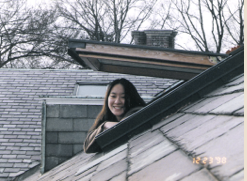
In launching my first blog, I’ve decided not to chronicle the ups and downs of the launch of my first novel—for the sake of my own sanity, and thus the sanity of those around me, and maybe yours as well. All I’ll say is that it’s both exciting and extremely nerve-racking; that working on my next novel would probably be more productive than pondering marketing strategies for this one; and that the comparisons to Amy Tan, however complimentary, are getting a tad worn out. And, of course, that connecting with readers like you makes everything worthwhile.
Instead, I want to take myself back in time, to my college years—1998, to be exact—when my dream was to “be a writer,” and the impossibility of this seemed matched only by the impossibility of finding anything else I loved more. Around this time, a writing professor, Jill Dawson, had us each gather ten statements about writing. About writing—what about it? Anything about it, as long as each statement spoke to us, to what writing meant to us.
I don’t remember how I culled my statements; I think I stole a few from Jill; good quotes weren’t so easily turned up online back then. And actually, when I dug up the old document just now, I counted eight, not ten, so maybe I never completed the assignment.
The photo above shows me poking my head out of the ceiling of my dorm room, which was essentially carved out of the attic of an old mansion. The ceiling sloped so low that my roommate and I were always knocking our heads against it. We tried pinning up bubble wrap, which had only the slightest mitigating effect. My next solution was to cover the ceiling with posters, photos, printouts—anything that would catch my eye, and remind me to duck. These “Statements About Writing” went up, too. I’m not sure if they saved me from any concussions, but they were always the last words I saw when I went to bed and the first words I saw when I woke.
Some of these statements don’t seem quite as profound to me now as they might have back then, and if I redid this exercise today, I’d probably revise the list substantially. But every one of them still speaks to me, very clearly, in at least one way: They’re about writing. Not about “being a writer,” but about writing. And—it’s not always easy to remember—writing is what it’s all about. Nothing else.
Statements About Writing
I want to write because I have the urge to excel in one medium of translation and expression of life. I can’t be satisfied with the colossal job of merely living.... Let me think clearly and brightly; let me live, love, and say it well in good sentences.
—Sylvia Plath
The essential function of art is moral. Not aesthetic, not decorative, not pastime and recreation. But moral. The essential function of art is moral. But a passionate, implicit morality, not didactic. A morality which changes the blood, rather than the mind. Changes the blood first. The mind follows later, in the wake.
—D.H. Lawrence
Use either no ornament or good ornament.
—Ezra Pound
The work itself, you know—sentence by sentence, page by page—it’s much too intimate, much too private, to come from anywhere but deep within the writer himself. It comes out of all the time a writer wastes. We stand around, look out the window, walk down the hall, come back to the page, and, in those intervals, something subterranean is forming, a literal dream that comes out of daydreaming.
—Don DeLillo
The point about music and song is that theirs is the sound of sheer feeling—as opposed to that of sense, verbal sense. To combine the two is always worth dreaming about.
—James Merrill
Form is never more than an extension of content.
—Charles Olson
Everything in life is writable about if you have the outgoing guts to do it, and the imagination to improvise. The worst enemy to creativity is self-doubt.
—Sylvia Plath
Kneel to your load, then balance your staggering feet
and walk up that coal ladder as they do in time,
one bare foot after the next in ancestral rhyme.
Because Rhyme remains the parentheses of palms
shielding a candle’s tongue, it is the language’s
desire to enclose the loved one in its arms ...
—Derek Walcott
